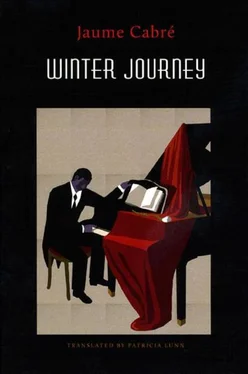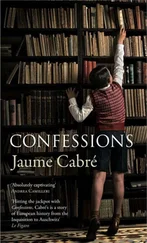He took another sip of the champagne and looked back, way back.
Zoltan Wesselenyi was playing B-flat, A, D-flat, B, C on the old piano in the archives where he spent all his time since he'd gotten sad. He repeated Fischer's theme and went over to the window. Outside, a sudden, strange, Mediterranean downpour fell from the Vienna sky.
"What's that?"
"The central theme."
"Didn't you say Fischer died in 1828?"
In response, the musicologist pointed to the papers. They were yellowed by time, but perfectly conserved. The scores were neat, done in a careful hand. It was strange music, lovingly written. Bros was amazed at how how Fischer, starting with that unusual little theme, had constructed a sarabande in G major. Or maybe in…
"It doesn't have a key. What's it in?"
"I don't know. It's not tonal. Or modal."
"That's impossible."
"No. That's how it is."
"It's beautiful."
"It's brilliant. And 1 can't stop wondering how he could write like this at the time of Mozart and Beethoven."
The development of the theme was made up of two sections of sixteen measures, each consisting of four phrases of sarabande two measures long, all based on the impossible theme. It was impeccable, masterful.
The two friends were silent for a long time, listening to the out-of-tune sound of the rain. Some drops from the squall were dripping on a metal object that had been left on the floor and making an insistent pinging in C sharp. It was irritating.
"This is really something," Bros said after a half hour of reading the seven variations.
"I'm going to publish it right away. This Fischer, without even trying, walks over Brahms and Wagner, goes beyond Mahler and stands before Schonberg. He wants to transform music before its possibilities are even exhausted."
"But he doesn't release it until he's dying."
"He must have been afraid of how people would react."
"He didn't destroy it, though." Pere Bros looked his friend in the eye. "And what if this is a fake? Have you thought that it might be a fraud?"
"That's the first thing 1 thought of, and I've had everything analyzed. The paper and the ink are from then, there's no doubt about it."
"Will you let me play it?"
When, after sundown, he took leave of his friend, he confessed that he was still moved by the memory of the D.96o he'd played at the Konservatorium, and he added in a lower voice and into his ear, My dear Zoltan, why did you give up performing when you're the best? Hmm? Why, when you're my compass?
He hugged him hard, as if he wanted his embrace to explain many other things. Wesselenyi broke free, smiled and said, Look, things happen. And to change the subject he promised that when the book on Fischer came out, he'd send it to him by special delivery wherever he was. If in return he'd read it and comment on it.
Pere Bros poured himself another glass of Veuve Ambal. Someone was knocking impatiently at the dressing room door. He paid no attention. He played B-flat, A, D-flat, B, C over and over on the upright. Three years had gone by since that find in the Vienna Archives, but he knew the theme and the development by heart. Then the door burst open. Pardo, red in the face and making heroic efforts not to explode, closed it behind him.
"What's the game? Madame Grossman says that… asks me to tell you she'd give anything to be able to play like you." Energetically, "She's excited and we have to take advantage of it."
"Tell her I've given my life to be able to play like me."
"No, no, no. No." Being reasonable was giving him a headache. "1'm trying to get her to double our fee for anything in France. Watch what you're doing and be nice to her."
"Get her out of here. Oh, and I'm not going out for the second part."
Pardo looked at how much was left in the bottle, took the glass out of his hands and said in a neutral voice:
"You said that ten times already. Okay, you've messed with me enough. Everybody has stage fright sometimes.
"But we all have a limit. And today 1 reached mine."
"You played beautifully."
"1 died beautifully." He wanted to say that he was sad. He wanted to shout it. But not at Pardo. He wanted to go to Vienna and say, It's over, Zoltan, no more traveling, no more thinking about what might have been; I've finally chosen between music and you. And you've won, in spite of your indifference, in spite of all the hours of work and practice that I'm thowing away, in spite of the sweet praise and applause and honors. That's what he wanted to say, more or less. And he wanted him to say, Oh, good, Peter.
"Why did you play the last sonata first?" burst out Pardo.
"I don't know. It just occurred to me. As if it were an ending. I was very…" His voice changed a little. "Schubert was in the first row. Seat seven."
When he heard this, Pardo gave him back the glass.
"It's better for you to drink. But not too much. Remember that Madame Grossman is outside with a friend of hers. This is important: double the fee. We can put off the reporter until tomorrow."
"I said I'm quitting."
"Having a full schedule this spring depends on little things like, for example, not seeing ghosts, not walking out of recitals in the middle, smiling at Madame Grossman and listening politely to her compliments."
"You can tell her to stuff them up her ass."
"If you don't go out for the second part, I know I'll have a heart attack."
They looked at one another for twenty seconds, long enough for both of them to remember the years of poverty, of endless traveling, of arguments, of earnings, of the days of happiness and tears that bound them together. Pardo pointed to the door and said in an encouraging voice, Shall 1 ask her to come in?
Pere Bros turned away contemptuously and Pardo, pale with rage, left the dressing room, closed the door, smiled broadly at the two impatient women and described, in Dantean terms, the sudden stomach problems suffered by poor Bros-who, meanwhile, was pouring himself more champagne in the dressing room. His hand was shaking. It had been shaking for thirty-eight years, since when he was nine and beginning with Srta. Trullols, until he was forty-seven and raising a full glass of Veuve Ambal. He drank to his health, to all the hours of practicing to be always perfect, inhuman, warm, human, brilliant, forceful, convincing, intense, subtle, tender, impeccable; always, always, always, always. So many hours with his nose to the grindstone, for nothing, now that he was saying Enough in a little room with a mirror surrounded by a thousand light bulbs, in the middle of a recital. So many hours of practicing and being afraid of Schubert. Get him out of here, he said softly to the encouraging glass. Kick him out. It's not right!
The intermission was ending, and Pardo came into the dressing room silently, sat down and waited for some kind of violent reaction. But Bros didn't even look at him; he just sat and drank. So Pardo decided to go on the attack.
"So all of a sudden you can't deal with stage fright?"
"You don't have to live with it; 1 do." Raising his voice, "Did you see Schubert?"
"There's no Schubert in the hall! 1 went and looked, 1 swear."
"He probably went out to the lobby to smoke a cigar. 1 can't go out if he's listening to me."
"You can't just turn your back on music!"
"I'm not turning my back on music. Just on performing."
"Listen, we can talk tomorrow about quitting, and we'll do whatever you say… But today… You have to finish the recital. And then, Madame Grossman."
"No."
"And you're going to quit like this, in the middle of a concert?"
"Yes. I don't even enjoy practicing because I'm thinking about how awful the concert's going to be. 1 can't stand so much stress. I've never been able to deal with so much stress."
Читать дальше












